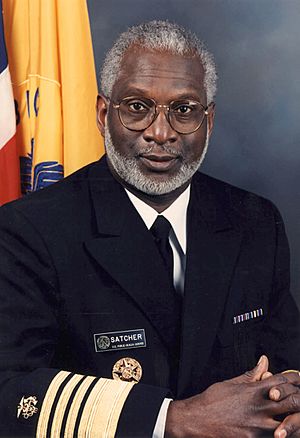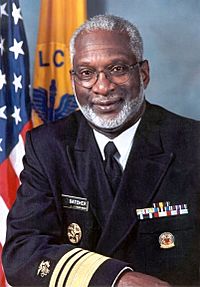David Satcher facts for kids
Quick facts for kids
David Satcher
|
|
|---|---|
 |
|
| 16th Surgeon General of the United States | |
| In office February 13, 1998 – February 12, 2002 |
|
| President | Bill Clinton George W. Bush |
| Preceded by | J. Jarrett Clinton (acting) |
| Succeeded by | Kenneth P. Moritsugu (acting) |
| 11th U.S. Assistant Secretary for Health | |
| In office February 13, 1998 – January 20, 2001 |
|
| President | Bill Clinton |
| Preceded by | Philip R. Lee |
| Succeeded by | Arthur Lawrence (acting) |
| 13th Director of the Centers for Disease Control | |
| In office 1993 – February 13, 1998 |
|
| President | Bill Clinton |
| Preceded by | William L. Roper |
| Succeeded by | Jeffrey Koplan |
| Personal details | |
| Born | March 2, 1941 Anniston, Alabama, U.S. |
| Political party | Democratic |
| Education | Morehouse College (BS) Case Western Reserve University (MD, PhD) |
| Military service | |
| Allegiance | |
| Service | U.S. Public Health Service |
| Service years | 1998–2002 |
| Rank | Admiral |
David Satcher (born March 2, 1941) is an American doctor and a leader in public health. He served as a four-star admiral in the United States Public Health Service Commissioned Corps. He was also the 16th Surgeon General of the United States, the nation's top doctor.
Contents
Early Life and Education
Satcher was born in Anniston, Alabama. When he was just two years old, he became very sick with whooping cough. A Black doctor named Dr. Jackson visited his family's farm. He told Satcher's parents that David might not survive, but he stayed all day to help.
This experience inspired Satcher to become a doctor himself. As a young man in college, he was active in the Civil Rights Movement, working to gain equal rights for African Americans.
Satcher graduated from Morehouse College in 1963. He then went to Case Western Reserve University, where he earned both a medical degree (MD) and a PhD in science. After finishing his degrees, he completed special training at several hospitals to become an expert in family medicine.
A Career in Medicine and Public Health
Dr. Satcher began his career teaching and leading at medical schools. From 1979 to 1982, he was a professor at the Morehouse School of Medicine. He later became the president of Meharry Medical College in Tennessee, serving from 1982 to 1993.
In 1993, President Bill Clinton appointed Satcher to lead the Centers for Disease Control and Prevention (CDC). The CDC is a major U.S. government agency that works to protect the country from diseases. Satcher was the first Black American to be the director of the CDC.
Leading the CDC
While Dr. Satcher was the director, the CDC faced a challenge. An investigation found that money Congress had approved for research on Chronic Fatigue Syndrome (CFS) was used for other projects. This happened from 1995 to 1998. A CDC official later said this was a mistake and a "breach of... trust."
Serving as the Nation's Doctor
In 1998, Dr. Satcher was appointed as the U.S. Surgeon General. He held this important job while also serving as the Assistant Secretary for Health. Because he had two major roles, he was given the rank of a four-star admiral.
As Surgeon General, Satcher worked to improve the health of all Americans. He released a major report about the dangers of smoking, especially for young people. The report showed that smoking was increasing among teenagers in all major ethnic groups.
He served as Surgeon General under both President Bill Clinton and President George W. Bush, leaving the position in 2002.
Life After Government Service
After his time as Surgeon General, Dr. Satcher continued his work in public health. He returned to the Morehouse School of Medicine to lead a center focused on primary care. Primary care doctors are often the first doctors people see for checkups and common illnesses.
In 2006, he founded the Satcher Health Leadership Institute at Morehouse. The institute works to end health disparities, which are unfair differences in health and healthcare among different groups of people.
Fighting for Health Equality
Dr. Satcher has often spoken about the need for everyone to have a fair chance at being healthy. In a 2005 article, he and other authors calculated that thousands of lives could be saved each year if health gaps between Black and white Americans were closed.
He pointed out that these gaps affect many areas, including heart disease, diabetes, and infant mortality (the death of babies). Dr. Satcher believes that everyone should have access to good healthcare. He supports a system where the government helps pay for everyone's medical costs.
Awards and Honors
Dr. Satcher has received many awards for his work in medicine and public health. Some of his honors include:
- The Public Health Service Distinguished Service Medal
- An honorary Doctor of Science degree from Harvard University (2011)
- The Jimmy and Rosalynn Carter Award for his contributions to human health (1999)
- The New York Academy of Medicine Lifetime Achievement Award (1997)
An academic society at the Case Western Reserve School of Medicine is named in his honor.


